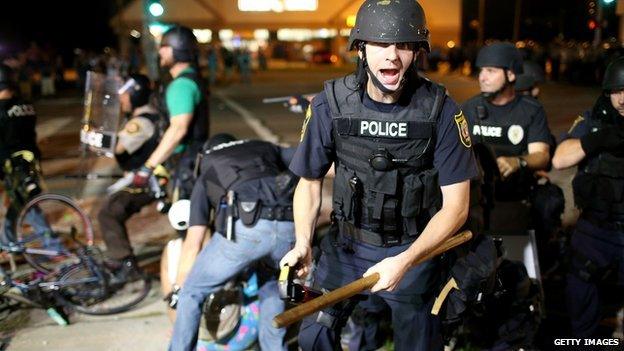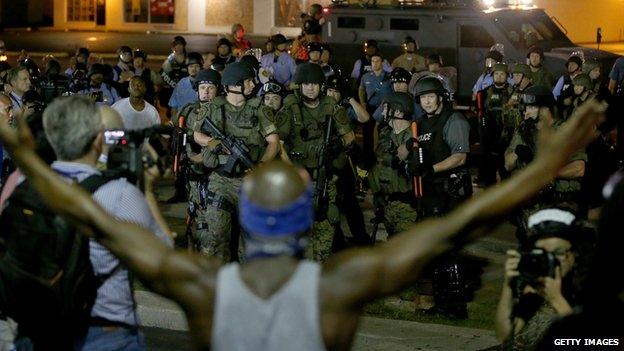The threat of 'big small government'
- Published
- comments

It has long been an assumed truth in US politics, particularly in conservative circles, that the most effective government is local government.
In the words, external of former Republican Vice-Presidential nominee Paul Ryan: "Government closest to the people governs best."
The American Conservative's Scott Galupo traces the idea, external back to Thomas Jefferson, who held that "the concentration of power begets tyranny" and advocated the "dispersal of power throughout multiple levels of government".
But has the police shooting of an unarmed black teenager and the subsequent violent protests in Ferguson, Missouri, exposed this belief as fundamentally flawed? What if local government, closest to the people, can be the most oppressive?
New York Magazine's Jonathan Chait says, external that Ferguson has revealed an "Orwellian monstrosity" growing in the US. And it's not simply about the militarisation of local law enforcement, although that has garnered the lion's share of press attention.
The problem, he says, is unchecked, unaccountable local power:
"The city's white-dominated council governs a mostly black city, and its oppressive, biased justice system is an instrument of fiscal (in additional to social) domination. Court fines account for a fifth of the city's revenue. Police officers disproportionately search black drivers, even though they disproportionately discover contraband among white ones. The city issues three warrants per household, and its draconian justice system appears designed to bleed its victims."
The New Republic's Franklin Foer comes to a similar conclusion, external:
"What Ferguson shows is that the heart of the problem is, in fact, small government - the cops, prosecutors and their bosses with an inflated sense of their powers. The great and growing threat to liberty in this country comes from states and localities run amok."
Chait points out that one would have a hard time finding recent examples of federal government abuse on a par with what occurred in Ferguson at the hands of the locals. And while what happened there was "somewhat outside the norm, it is hardly a freakish anomaly".
Americans are surrounded by "big small government", he says. "We simply haven't trained our minds to notice it."
It isn't the federal government that overregulates certain professions - plumbers, beauticians, and taxi drivers, for instance - it's local governments. It isn't the federal government that drives up housing costs with burdensome zoning regulations, he says, it's local governments.
Foer also identifies civil forfeiture laws as a source of small-government oppression.
"Authorities can unilaterally confiscate cash or property that it considers illegally begotten; many states then place the proceeds straight into its own coffers to fund further crime-fighting," he writes. Government authorities often can do this without even presenting criminal charges.
Both Foer and Chait contend that the current situation has arisen in part because of a lack of oversight and accountability.
Few people pay attention to their local leaders, such as their state representatives, Chait writes. Studies show they're elected almost always based on their party affiliation, and their success flows from partisan winds blowing out of Washington, DC.
Foer notes that as states and localities grow increasingly liberal or conservative thanks to demographic shifts, the prospect of a plausible political alternative to check excesses disappears. Add to that the lack of an aggressive local media thanks to the long, slow decline of newspapers, and it's a formula for unchecked corruption.

Militarised police is a reflection of local government excess and abuse, writes Jonathan Chait
"These are boom times for provincial autocrats," he writes.
The solution, both Chait and Foer conclude, is to have the federal government step in to combat corruption and overregulation.
"Only a strong federal government can curb the autocratic tendencies burbling across the country," Foer writes.
It's a counterintuitive response bordering on heresy for most conservatives. Getting them to buy in will be difficult, Galupo admits.
"What all this means, perhaps, is that, as a polity, we're unhealthily obsessed with the federal government," Galupo writes. "For conservatives, this obsession, hardly confined to the fringes, often borders on paranoia. And the legacy of Jefferson has left them blind to the kind of government intrusiveness and bullying (and worse) that actually, and profoundly, affects our daily lives."
The left is little better, Chait acknowledges, as they tend to view any push against government regulation as motivated by greed or vested interests.
"Democratic voters tend to apply an ideology shaped by high-profile national struggles to their local voting habits; they may, for instance, associate arguments against regulation with the sorts of spurious claims made by polluters, Wall Street or other robber barons," he writes.
Given these obstacles, is there any chance Ferguson can serve as a wake-up call to the US public?
Galupo hopes that a growing libertarian movement on the right can form an alliance with the Democratic centre-left to take a more "holistic approach to government reform".
Foer and Chait, on the other hand, seems less optimistic. Foer says libertarians are so fixated on Washington that they "rigidly insist on devolving power down to states, cities, and towns - the very places where their nightmares are springing to life".
Chait concludes:
"The myth of localism is rooted deep in our political psyche. Left and right alike use small and local as terms of approbation, big and bureaucratic as terms of abuse. None of us is equipped to see that the government that actually oppresses us is that which is closest to us."